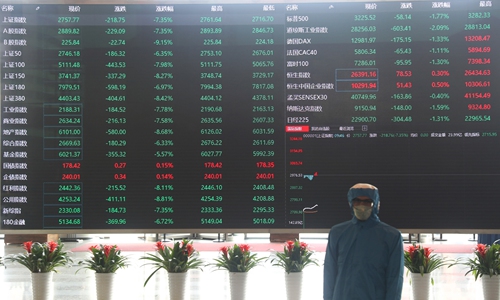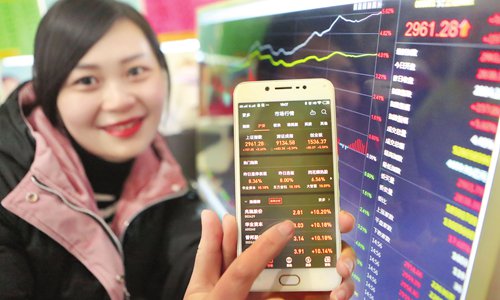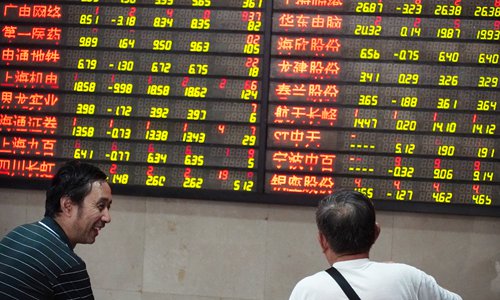
China's A-share market reopens on Monday, its first trading day of the Year of the Rat, losing heavily across the board. Photo: CNS Photo
The Chinese mainland equity market bled on Monday, the first trading day of the Year of the Rat, despite a slew of measures announced over the weekend to allay investors' fears over the spread of the novel coronavirus.
Regarding the spectacular slump as an overreaction to the downside pressure on the market amid a mix of unfavorable factors, market watchers hope for the sellout to make room for investors to switch back to risk-on as more support for the market is expected in the pipeline.
The flagship Shanghai Composite Index tumbled by 8.73 percent at the open on Monday, its worst opening since 1997. More than 3,000 stocks out of 3,700-plus stocks traded on the mainland market fell to their daily 10 percent limit at the open.
The Shanghai index pared some of its losses to finish down 7.72 percent, or 229.92 points, at 2,746.61 points, its biggest drop since a market rout in 2015. The number of stocks plunging by their daily limit rose to nearly 3,200 by the close of the market.
Both the Shenzhen Component Index and the tech-heavy ChiNext index also suffered heavily.
"The negativity around the A-share market is inevitable, both from a sentiment and fundamental perspective, and the re-opened market proved it," Lynda Zhou, equities chief investment officer in China at Fidelity International, said in a note sent to the Global Times on Monday.
The death toll from the novel coronavirus initially diagnosed in Wuhan, Central China's Hubei Province rose to 361 as of Sunday, outnumbering that for SARS which claimed 349 domestically.
Woes over the virus apparently kept investors on edge, frustrating their expectations for a less-panicky sellout on government efforts to dispel anxieties.
The People's Bank of China (PBC), the country's central bank, announced on Sunday an injection of 1.2 trillion yuan ($171 billion) into the money market on Monday via reverse repurchase agreements. In addition, the central bank surprised the markets by lowering the reverse repo rates by 10 basis points on Monday, in a bid to arrest downside risks to the economy.
The China Securities Regulatory Commission (CSRC) also announced Sunday a trading halt for futures in the evening sessions starting Monday. The regulator has also purportedly required multiple brokers to suspend new securities lending deals to inhibit short selling.
Hedging instruments are being mulled and will be announced to assuage market panic, according to the CSRC, which told investors one day before the market reopened after an extended Spring Festival holiday break that the impact of the virus on the stock market will be temporary and won't change the longer-term market trend.

A stock market investor shows off her earnings on Monday in the city of Mianyang, Southwest China's Sichuan Province. Chinese mainland indexes surged more than 5 percent Monday on news of trade talks progress. Photo: VCG
Market overreacting"I wouldn't say that these measures failed to take effect, but the market appears to have been oversold due to a mix of unfavorable factors including the novel coronavirus, an H5N1 bird flu outbreak in [Central China's Hunan Province], a 5.1-magnitude earthquake which hit [Southwest China's] Sichuan Province, and the WHO's declaration [of a global public health emergency over the coronavirus]," Wu Jinduo, head of fixed income at the research institute of Great Wall Securities, told the Global Times on Monday.
The slump amid anxieties arising from the virus outbreak still largely falls within market expectations, according to Wu, urging investors to avoid a selloff out of the virus fear.
She cited estimates by Zhong Nanshan, a renowned Chinese respiratory scientist who helped the nation fight SARS and has now taken the lead in a government-appointed expert panel to tackle the virus. Zhong said on Sunday that the epidemic would peak in the next 10 to 14 days.
With the epidemic peaking in the near term and economic activity gradually returning to normal later in February, the market is highly likely to stabilize in the foreseeable future, according to Wu, predicting that the Shanghai index would undergo swings before rebounding at the 2,900 level, therefore making room for future gains.
In a sign that the worse might possibly be over, the Hang Seng Index, which posted heavy losses during the Spring Festival holiday while its mainland counterparts were closed, swung back to the positive territory at market close on Monday.
In another sign, the China A50 index futures trade in Singapore that enables investors to assess the A-share market, had plunged by roughly 9 percent during the break, suggesting Monday's slump might have sufficiently unleashed the panic over the virus outbreak.
Few people would mention the SARS period if horrific moments for the A-share market were to be recalled, said Lu Zhengwei, chief economist at Industrial Bank in Shanghai.
"If the SARS epidemic left investors with no memory, why would you take the current matter too seriously?" he asked.
The "overall impacted time period should be shorter than SARS," Zhou at Fidelity International said, noting that "bottom fishing on oversold quality names all make sense."
While a consumption upgrade will likely be hurt in the short term, more consumption is expected to shift online, Zhou said, citing opportunities in the market that include online games, video and education, as well as a boon in the mid-term for smart manufacturing and industrial automation.
Other than influenza treatment and facial mask stocks, online related sectors, notably work on the cloud via the internet, online games and education defied Monday's plunge, with a handful of related stocks surging by their daily limit.
Call for more support measures
Still, industry veterans are calling upon the government to roll out more support measures to shore up the market.
Wu said the central bank might consider targeted cuts in reserve requirements and interest rates to help small and micro-sized businesses.
While April and May 2003 were the most notable months when the stock market was hit by the SARS, the current epidemic is likely to make a dent on the market mostly in February, she said, adding that the securities regulator is likely to temporarily suspend or postpone the delisting of firms with poor performances as the financial disclosures of some of the listed firms might fall short of expectations in the first quarter.
For her part, Zhou said the central bank ought to make more preemptive efforts to prevent systematic risks when the economy has a sudden drop in GDP growth terms. A more loosened fiscal policy should also be in the pipeline, such as an increase in budget deficits and tax cuts to allow for the business sector to survive tough times.


